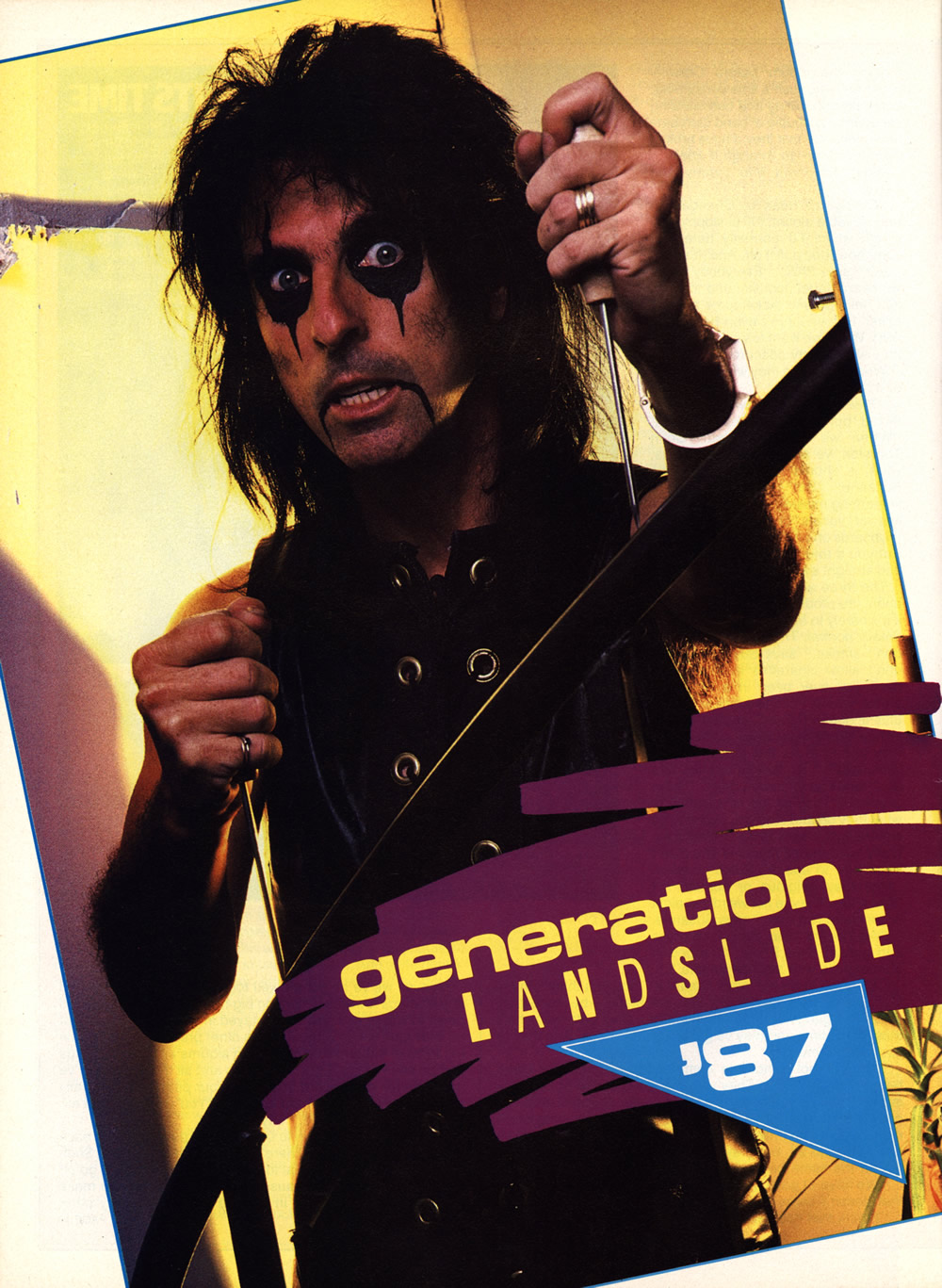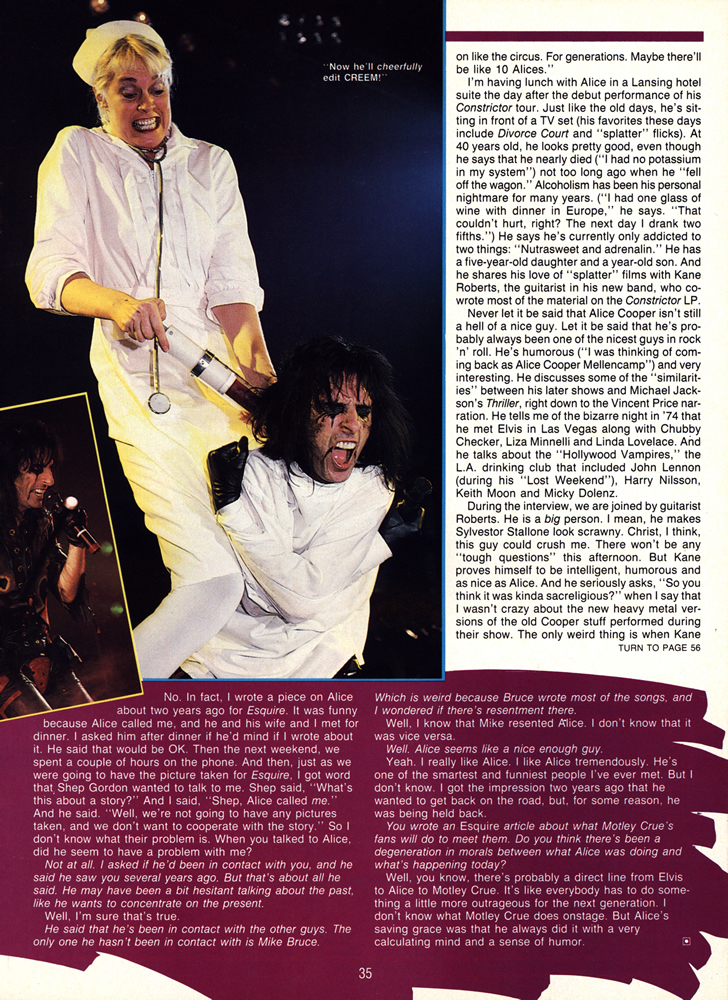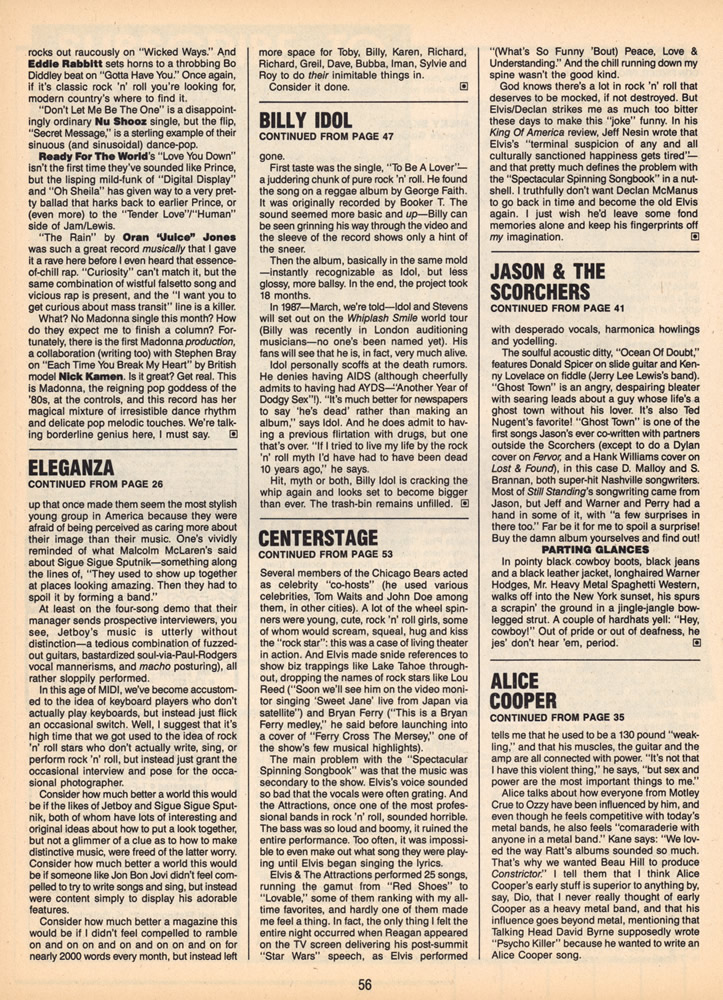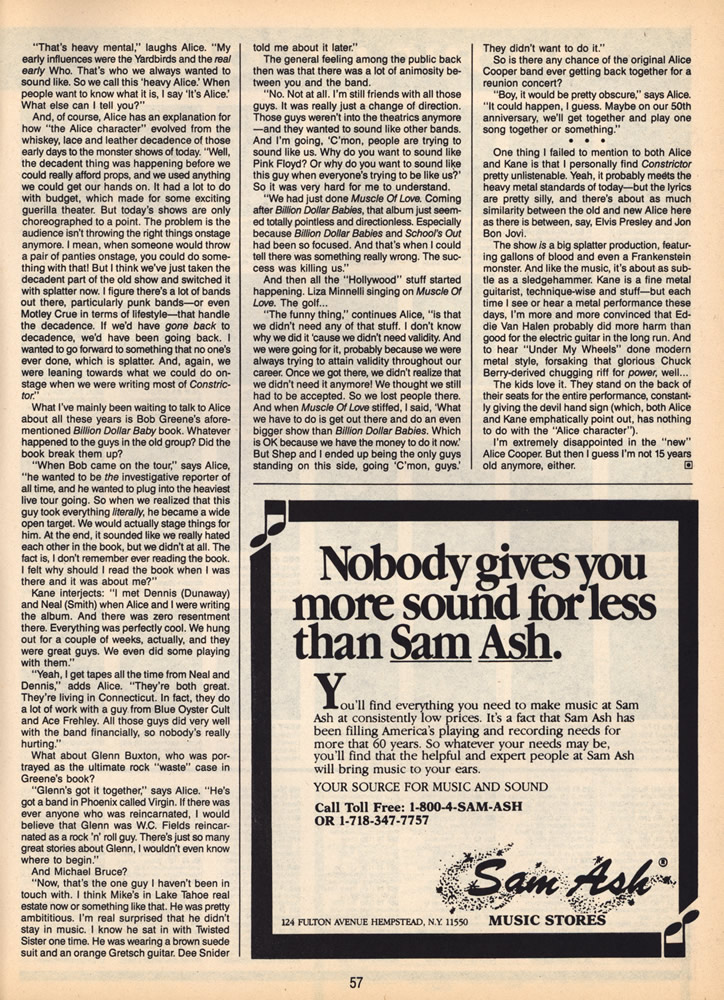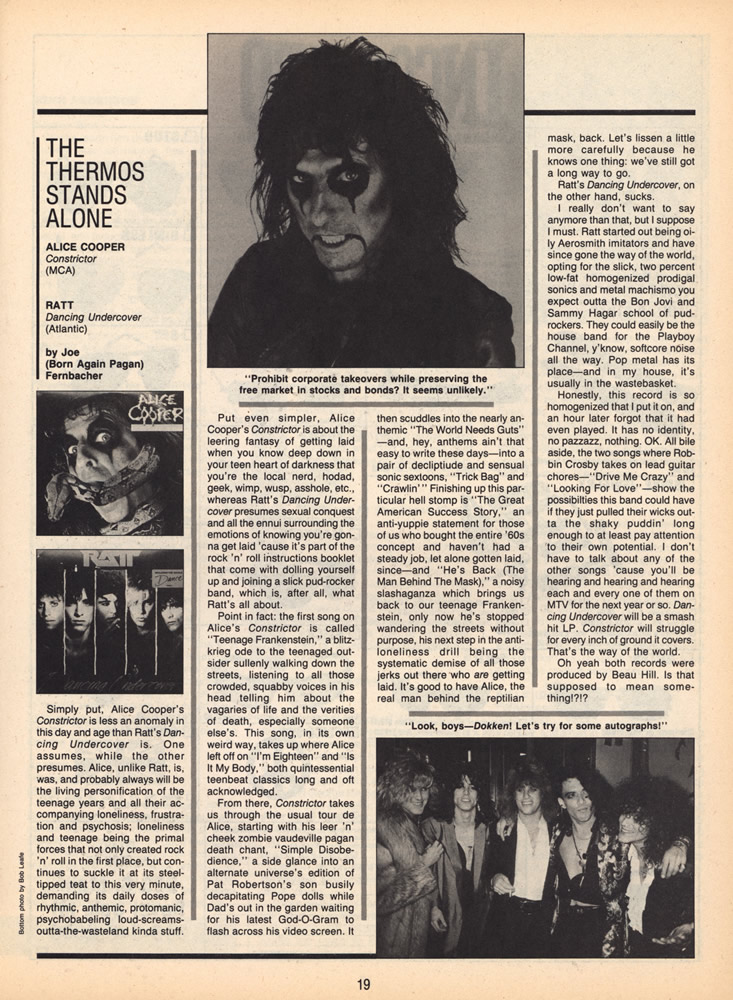Article Database
Generation Landslide '87
Alice Cooper Returns
First things first.
Alice Cooper's "Under My Wheels" is a rock 'n' roll classic. You can put it on a party tape or hear it on the radio after, say, something from the Stones' Exile On Main Street, and it doesn't sound a bit out of place. I always thought it was a Detroit rock 'n' roll song. "Under My Wheels" hold its own as one of the best rock songs to come out of the '70s.
Like a Chuck Berry poem, Alice Cooper's "I'm Eighteen" is timeless as far as anthems are concerned. There's always going to be some teenager somewhere whose going to love it (to death). What's more, it's one of those musical wonders of the world, meaning pure magic created from three simple cords. And by the same token, what kid can possibly resist "School's Out," especially when summer vacation is approaching?
I was 15 when I first heard Alice Cooper's music, though I'd heard of the band several years earlier in (of all places) a Parade magazine item about this rock singer who thought he was the reincarnation of a little girl who burned to death in 18th century England. (Shep Gordon, Alice's manager, was always a publicity genius.) Anyway, "I'm Eighteen" originally broke big on CKLW, a Windsor AM station that was heard throughout Michigan. Plus, the law had just been changed in Michigan, lowering the drinking age to 18. Needless to say, Love It To Death was a very popular record in my high school. I can remember playing air guitar and lip-synching to it many days after school. Then I read this article about Alice Cooper in CREEM magazine. They sure seemed strange.
Some friends and I went to see Alice Cooper in concert at a Saginaw theater in 1971. It was the day Killer was released, so we hadn't heard any of the songs at the time. We walked into a Taco Bell near the small auditorium were standing there, and (I'm not making this up) the entire Alice Cooper band were standing there, waiting for their orders. They were the weirdest looking people I'd ever seen in my life, and they were scary in a foreboding sort of way. When they went to their car, we asked the guy (who we later found out was Shep Gordon) if he'd get their autographs for us because, frankly, we were scared of these potential psychopaths. Gordon laughed, took us to the car, and the guys in the band - Alice, is particular - turned out to be very friendly. The show that night was transcendental. The theatrics - which relied on thrilling decadence more than horror back then - were excellent. But the music was even better, and it was the music that made it a great rock 'n' roll show. The fact that we met the band again afterwards (it was that kind of venue) - and they were still nice and glamorous - made me an even bigger fan.
After that, I must've seen Alice Cooper at least 20 times between 1971 and '73. Saw them everywhere in Michigan, parts of Ohio, and once in Hollywood, Florida. Saw Alice do forbidden things onstage that would later make punk rock look tame in comparison. Saw them go from small auditoriums to huge sold-out arenas. Saw them have number one records, and, at one point, become the biggest rock band in the world. Saw all the glitter/glam rock that followed them. Saw each rock band try to out-transvestite the others, and marvelled when I saw Mick Jagger on national TV with blue mascara and glitter around his eyes. Saw the shows become more like comic books, thinking they were downright silly at times. But even then, the band managed to balance the silliness with a knowing sense of humour and good songs. The lyrics to "I Love The Dead" or "Blue Turk" may sound revoltingly silly to me in 1987, but the music still sounds great and rooted in the rock 'n' roll tradition. And sometimes the music and lyrics still gelled terrifically on stuff like "Billion Dollar Babies" and "Public Animal #9." When I graduated from high school, my class prophecy was that I would someday "own a rock 'n' roll auditorium with a permanent booking for Alice Cooper."
Muscle Of Love was the last Alice Cooper album I bought. It was also the last tour I saw. The record was weak, and, despite a humorous mugging of Santa Claus to the strains of Bing Crosby's "White Christmas," the show seemed tired. It was soon discovered that "Santa" was played by Chicago columnist and author Bob Greene, who would later write a book about his experience called Billion Dollar Baby. It's one of the best rock books I've ever read, and it revealed that Alice and the band were no longer exactly the best of friends. They split soon after the book was published. Alice went "solo," and his former band billed themselves as Billion Dollar Babies, releasing one album before fading into obscurity.
Alice himself had several more years of "good" fortune. His concerts were elaborate monster shows . He had a series of hit ballads; nice melodies but he seemed to be turning into the Barry Manilow of hard rock. He appeared on Hollywood Squares. He hung out and played golf with Hollywood types. But even his musical heavyweights like Dick Wagner and Steve Hunter backing him up, the songs were no longer there, and it became increasingly evident that Michael Bruce (check the credits on the early LPs) was the songwriting force behind Alice Cooper. By the time I saw Alice dressed like a gangster and dancing with a bunch of chickens on Johnny Carson, I'd totally given up on the guy. Alice tried to make several comebacks during the late '70s, even covering cool songs by Love and the Music Machine during the "new wave" era - but I'd closed the door on him by then, viewing him as a great but faded page in the story of rock 'n' roll.
"A lot of those things backfired," Alice now says. "Like me showing up on Hollywood Squares was great. It was on purpose. The same woman who wouldn't let her kid come to one of our shows was on there trying to win a car. And I was sitting there, thinking 'This is great.' But the audience didn't get it. They thought I really wanted to do that. They thought I had been Alice Cooper to get to the position so I could be on Hollywood Squares. The same with the golf thing. It ends up that every heavy metal guy I know plays golf now, from Motley Crue to Iron Maiden. But if I play golf, it's a cardinal sin because I represent all that is not parents. So I don't play golf anymore. I'll give that up.
"The only thing that bothered me in my whole career about my fans is that they didn't get the joke. I didn't really want to live in Las Vegas. I didn't want to play golf with Bob Hope the rest of my life. But it was funny that I did. I mean, I'm a hard rocker from Detroit. I'll always be a hard rocker. When the ballads came out, I can understand how people thought I was selling out. But it was the only way I could keep my hand in the game during disco, because they wouldn't play my records or Aerosmith or anyone in that genre of rock 'n' roll on the radio then. Anything with a guitar was out. So we did ballads, which was like a hand in poker. You had to keep your hand in the game, even if it was a losing one. Accidentally, the ballads became hits! I went 'Oh, no, the last thing I need is a hit ballad!' One would've been fine, but there were four Top 20 ballad hits! If it had been my choice, I wouldn't have released those songs as singles. It was like I was becoming Tony Bennett or something.
"We were going to have a little sticker on Constrictor that said 'Featuring no ballads.' Constrictor is totally the direction now that I want to follow for as long as I can. Of course, when you get too old to do this, 55 years old or so, I'm going to create a new Alice. Because I want Alice to go on like a circus. For generations. Maybe they'll be like 10 Alices."
I'm having lunch with Alice in a Lansing Hotel suite the day after the debut performance of his Constrictor tour. Just like the old days, he's sitting in front of a TV set (his favorite these days include Divorce Court and "splatter" flicks). At 40 years old he looks pretty good, even though he says that he nearly died ("I had no potassium in my system") not too long ago when he "fell off the wagon." Alcoholism has been his personal nightmare for many years. ("I had one glass of wine with dinner in Europe," he says. "That couldn't hurt, right? The next day I drank two fifths.") He says he's currently only addicted to two things: "Nutrasweet and adrenalin." He has a five-year old daughter and a year-old son. And shares his love of "splatter" films with Kane Roberts, the guitarist in his new band, who co-wrote most of the material on the Constrictor LP.
Never let it be said that Alice Cooper isn't still a hell of a nice guy. Let it be said that he's probably always been one of the nicest guys in rock 'n' roll. He's humorous ("I was thinking of coming back as Alice Cooper Mellencamp") and very interesting. He discusses some of the "similarities" between his later shows and Michael Jackson's Thriller, right down to the Vincent Price narration. He tells me of the bizarre night in '74 that he met Elvis in Las Vegas along with Chubby Checker, Liza Minnelli and Linda Lovelace. And he talks about the "Hollywood Vampires," the L.A. drinking club that included John Lennon (during his "Lost Weekend"), Harry Nilsson, Keith Moon and Micky Dolenz.
During the interview, we are joined by guitarist Roberts. He is a big person. I mean, he makes Sylvestor Stallone look scrawny. Christ, I think, this guy could crush me. There won't be any "tough questions" this afternoon. But Kane proves himself to be intelligent, humorous and as nice as Alice. And he seriously asks, "So you think it was kinda sacreligious?" when I say that I wasn't crazy about the new heavy metal versions of the old Cooper stuff performed during their show. The only weird thing is when Kane tells me he used to be a 130 pounds "weakling," and that his muscles, the guitar and the amps are all connected with power. "It's not that I have this violent thing," he says, "but sex and power are the most important things to me."
Alice talks about how everyone from Motley Crue to Ozzy have been influenced by him, and even though he feels competitive with today's metal bands, he also feels "camaraderie with anyone in a metal band." Kane says: "We loved the way the way Ratt's album sounded so much. That's the way we wanted Beau Hill to produce Constrictor." I tell them that I think Alice Cooper's early stuff is superior to anything by, say, Dio, that I never really thought of early Cooper as a heavy metal band, and that his influence goes beyond metal, mentioning that Talking Head David Bryne supposedly wrote "Psycho Killer" because he wanted to write an Alice Cooper song.
"That's heavy mental," laughs Alice. "My early influences were the Yardbirds and the real early Who. That's who we wanted to sound like. So we call this 'heavy Alice.' When people want to know what it is, I say, 'It's Alice.' What else can I tell you?"
And, of course, Alice has an explanation for how "the Alice character" evolved from the whiskey, lace and leather decadence of those early days to the monster shows of today. "Well, the decadent thing was happening before we could really afford props, and we used anything we could get our hands on. It had a lot to do with budget, which made for some exciting guerilla theater. But today's shows are only choreographed to a point. The problem is that audience isn't throwing the right things on stage anymore. I mean, when someone would throw a pair of panties onstage, you could do something with that! But I think we've just taken the decadent part of the old show and switched it with splatter now. I figure there's a lot of bands out there, particularly punk bands - or even Motley Crue in terms of lifestyle - that handle the decadence. If we'd gone back to decadence, we'd have been going back. I wanted to go forward to something that no one's ever done, which is splatter. And, again, we were leaning towards what we could do onstage when we were writing most of Constrictor."
What I've been mainly been waiting to talk to you about all these years is Bob Greene's aforementioned Billion Dollar Baby book. Whatever happened to the guys in the old group? Did the book break them up?
"When Bob came on the tour," says Alice, "he wanted to be the investigative reporter of all time, and he wanted to plug into the heaviest tour going. So when we realised that this guy took everything literally, he became a wide open target. We would actually stage things for him. At the end, it sounded like we really hated each other in the book, but we didn't at all. That fact is, I don't remember ever reading the book. I felt why should I read the book when I was there and it was about me?"
Kane interjects: "I met Dennis (Dunaway) and Neal (Smith) when Alice and I were writing the album. And there was zero resentment there. Everything was perfectly cool. We hung out for a couple of weeks, actually, and they were great guys. We even did some playing with them."
"Yeah, I get tapes all the time from Neal and Dennis," adds Alice. "They're both great. They're living in Connecticut. In fact, they do a lot of work with a guy from Blue Oyster Cult and Ace Frehley. All those guys did very well with the band financially, so nobody's really hurting."
What about Glen Buxton, who was portrayed as the ultimate rock "waste" case in Greene's book?
"Glen's got it together," says Alice. "He's got a band in Phoenix called Virgin. If there was ever anyone who was reincarnated, I would believe that Glen was W.C. Fields reincarnated as a rock 'n' roll guy. There's just so many great stories about Glen, I wouldn't even know where to begin."
And Michael Bruce?
"Now, that's one guy I haven't been in touch with. I think Mike's in Lake Tahoe real estate now or something like that. He was pretty ambitious. I'm real surprised that he didn't stay in music. I know he sat in with Twisted Sister one time. He was wearing a brown suede suit and an orange Gretsch guitar. Dee Snider told me about it later."
The general feeling among the public back then was that there was a lot of animosity between you and the band.
"No. Not at all. I'm still friends with all those guys. It was really just a change of direction. Those guys weren't into the theatrics anymore - and they wanted to sound like other bands. And I'm going, 'C'mon, people are trying to sound like us. Why do you want to sound like Pink Floyd? Or why do you want to sound like this guy when everyone's trying to be like us?' So it was very hard for me to understand.
"We had just done Muscle Of Love. Coming after Billion Dollar Babies, that album just seemed pointless and directionless. Especially because Billion Dollar Babies and School's Out had been so focused. And that's when I could tell there was something really wrong. The success was killing us."
And then all the "Hollywood" stuff started happening. Liza Minnelli singing on Muscle Of Love. The golf...
"The funny thing," continues Alice, "is that we didn't need any of that stuff. I don't know why we did it 'cause we didn't need validity. And we were going for it, probably because we were always trying to attain validity throughout our career. Once we got there, we didn't realize that we didn't need it anymore! We thought we still had to be accepted. So we lost people there. And when Muscle Of Love stiffed, I said, 'What we have to do is get out there and do an even bigger show than Billion Dollar Babies. Which is OK because we have the money to do it now. But Shep and I ended up being the only guys standing on this side, going 'C'mon, guys.' They didn't want to do it."
So is there any chance of the original Alice Cooper band ever getting back together for a reunion concert?
"Boy, it would be pretty obscure," says Alice. "It could happen, I guess. Maybe on our 50th anniversary, we'll get together and play one song together or something.
One thing I failed to mention to both Alice and Kane is that I personally find Constrictor pretty unlistenable. Yeah, it probably meets the heavy metal standards of today — but the lyrics are pretty silly, and there's about as much similarity between the old and new Alice here as there is between, say, Elvis Presley and Bon Jovi.
The show is a big splatter production, featuring gallons of blood and even a Frankenstein monster. And like the music, it's about as subtle as a sledgehammer. Kane is a fine metal guitarist, technique-wise and stuff - but each time I see or hear a metal performance these days, I'm more convinced that Eddie Van Halen probably did more harm than good for the electric guitar in the long run. And to hear "Under My Wheels" done modern metal style, forsaking that glorious Chuck Berry-derived chugging riff for power, well...
The kids love it. They stand on the back of their seats for the entire performance, constantly giving the devil hand sign (which, both Alice and Kane emphatically point out, has nothing to with the "Alice character").
I'm extremely disappointed in the "new" Alice Cooper. But then I guess I'm not 15 years old anymore, either.
Billion dollar baby revisited
Bob Greene, a contributing editor to Esquire, writes a Chicago Tribune column that is nationally syndicated. He is also the author of eight books. His 1974 Billion Dollar Baby (currently out of print) is probably the best book ever written about a rock 'n' roll tour. Greene recently spoke to CREEM about his experiences with Alice Cooper.
When I talked to Alice, he said he hadn't read the book. But I always thought the book was part of the reason the band broke up.
I don't know that they broke up because of the book. They were obviously in the process of breaking up during the tour. They were having a lot of problems while I was seeing them. And I saw the band sort of disintegrating before my eyes. They just didn't get together very much on the road with Alice. It was always like the other guys were just a step below. I don't think the book broke the band up, but it may have hastened it.
From the book, it seemed there was a lot of jealousy on the part of the band towards Alice. They started together, and suddenly he was the star.
Yeah, which was very much how Shep planned it. Yeah. They were very hurt that Alice was suddenly becoming a superstar. And Alice had his own bodyguards, and they didn't. Or Alice had his limousine, and they would go in the other limousine. And what they said at the time was that everyone knew the names of the Beatles and the Rolling Stones, but the only name people knew in their band was Alice Cooper. And Shep would tell them that they wouldn't be making so much money if that wasn't the case.
Have you kept in touch with any of the other guys besides Alice?
No. In fact, I wrote a piece on Alice about two years ago for Esquire. It was funny because Alice called me, and he and his wife and I met for dinner. I asked him after dinner if he'd mind if I wrote about it. He said that would be OK. Then the next weekend, we spent a couple of hours on the phone. And then, just as we were going to have the picture taken for Esquire, I got word that Shep Gordon wanted to talk to me. Shep said, "What's this about a story?" And I said, "Shep, Alice called me." And he said. "Well, we're not going to have any pictures taken, and we don't want to cooperate with the story." So I don't know what their problem is. When you talk to Alice, did he seem to have a problem with me?
Not at all. I asked if he'd been in contact with you, and he said he saw you several years ago. But that's about all he said. He may have been a bit hesitant talking about the past, like he wants to concentrate on the present.
We'll I'm sure that's true.
He said that he's been in contact with the other guys. The only one he hasn't been in contact with is Mike Bruce. Which is weird because Bruce wrote most of the songs, and I wondered if there's resentment there.
Well, I know that Mike resented Alice. I don't know that it was vice versa.
Well. Alice seems a nice enough guy.
Yeah. I really like Alice. I like Alice tremendously. He's one of the smartest and funniest people I've ever met. But I don't know. I got the impression two years ago that he wanted to get back on the road, but, for some reason, he was being held back.
You wrote an Esquire article about what Motley Crue's fans will do to meet them. Do you think there's been a degeneration in morals between what Alice was doing and what's happening today?
Well, you know, there's probably a direct line from Elvis to Alice to Motley Crue. It's like everybody has to do something a little more outrageous for the next generation. I don't know what Motley Crue does onstage. But Alice's saving grace was that he always did it with a very calculating mind and a sense of humor.
The Thermos Stands Alone
ALICE COOPER — Constrictor (MCA)
RATT — Dancing Undercover (Atlantic)
Author: Joe Fernbacher
Simply put, Alice Cooper's Constrictor is less an anomaly in this day and age than Ratt's Dancing Undercover is. One assumes, while the other presumes. Alice, unlike Ratt, is, was, and probably always will be the living personification of the teenage years and all their accompanying loneliness, frustration and psychosis; loneliness and teenage being the primal forces that not only created rock 'n' roll in the first place, but conntinues to suckle it at its steeltipped teat to this very minute, demanding its daily doses of rhythmic, anthemic, protomanic, psychobabeing loud-screams-outta-the-wasteland kinda stuff.
Put even simpler, Alice Cooper's Constrictor is about the leering fantasy of getting laid when you know deep down in your teen heart of darkness that you're the local nerd, hodad, geek, wimp, wusp, asshole, etc., whereas Ratt's Dancing Undercover presumes sexual conquest and all the ennui surrounding the emotions of knowing you're gonna get laid 'cause it's part of the rock 'n' roll instructions booklet that come with dolling yourself up and joining a slick pud-rocker band, which is, after all, what Ratt's all about.
Point in fact: the first song on Alice's Constrictor is called "Teenage Frankenstein," a blitzkrieg ode to the teenaged outsider sullenly walking down the streets, listening to all those crowded, squabby voices in his head telling him about the vagaries of life and the verities of death, especially someone else's. This song, in its own weird way, takes up where Alice left off on "I'm Eighteen" and "Is lt My Body," both quintessential teenbeat classics long and oft acknowledged.
From there, Constrictor takes us through the usual tour de Alice, starting with his leer 'n' cheek zombie vaudeville pagan death chant, "Simple Disobedience," a side glance into an alternate universe's edition of Pat Robertson's son busily decapitating Pope dolls while Dad's out in the garden waiting for his latest God-O-Gram to flash across his video screen. It then scuddles into the nearly anthemic "The World Needs Guts" — and, hey, anthems ain't that easy to write these days — into a pair of decliptiude and sensual sonic sexloons, "Trick Sag" and "Crawlin' ". Finishing up this particular hell stomp is "The Great American Success Story," an anti-yuppie statement for those of us who bought the entire '60s concept and haven't had a steady job, let alone gotten laid, since — and "He's Back (The Man Behind The Mask)," a noisy slashaganza which brings us back to our teenage Frankenstein, only now he's stopped wandering the streets without purpose, his next step in the antiloneliness drill being the systematic demise of all those jerks out there who are getting laid. It's good to have Alice, the real man behind the reptilian mask, back. Let's listen a little more carefully because he knows one thing: we've still got a long way to go.
Ratt's Dancing Undercover, on the other hand, sucks.
I really don't want to say anymore than that, but I suppose I must. Ratt started out being only Aerosmith imitators and have since gone the way of the world, opting for the slick, two percent low-fat homogenized prodigal sonics and metal machismo you expect outta the Bon Jovi and Sammy Hagar school of pudrockers. They could easily be the house band for the Playboy Channel, y'know, softcore noise all the way. Pop metal has its place — and in my house, it's usually in the wastebasket.
Honestly, this record is so homogenized that I put it on, and an hour later forgot that it had even played. It has no identity, no pazzazz, nothing. OK. All bile aside, the two songs where Robbin Crosby takes on lead guitar chores — "Drive Me Crazy" and "Looking For Love" — show the possibilities this band could have if they just pulled their wicks outta the shaky puddin' long enough to at least pay attention to their own potential. I don't have to talk about any of the other songs 'cause you'll be hearing and hearing and hearing each and every one of them on MTV for the next year or so. Dancing Undercover will be a smash hit LP. Constrictor will struggle for every inch of ground it covers. That's the way of the world.
Oh yeah both records were produced by Beau Hill. Is that supposed to mean something!?!?



